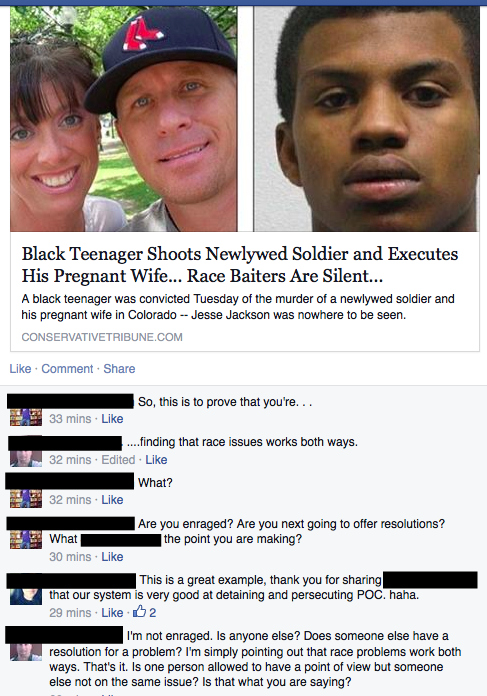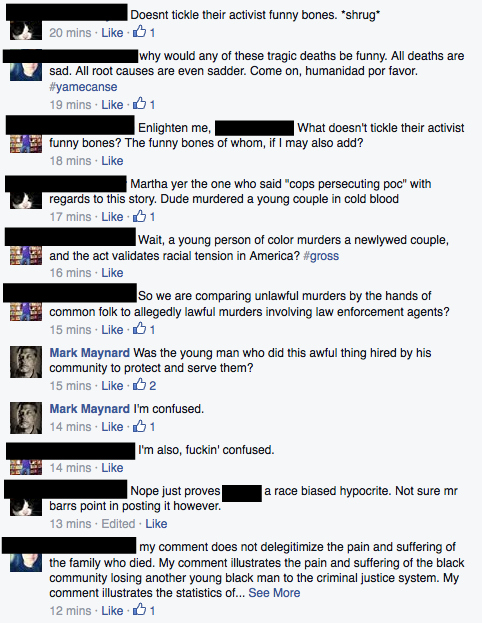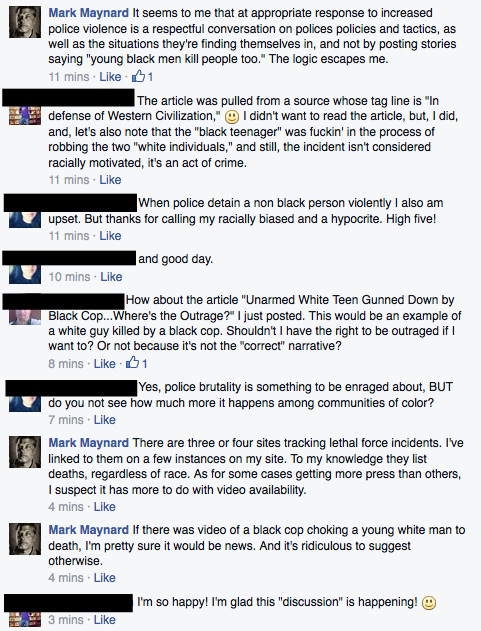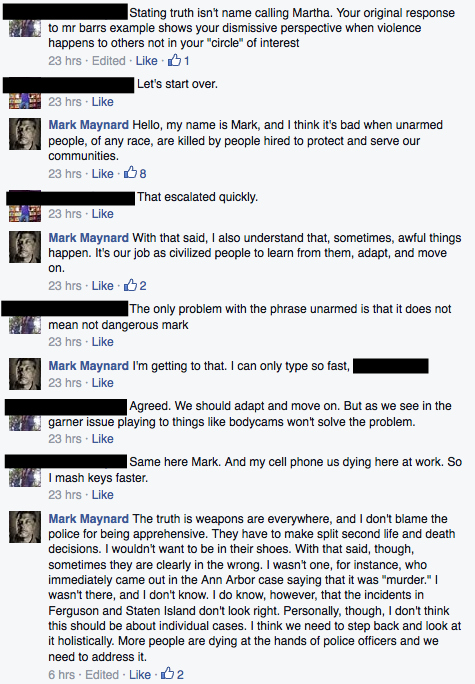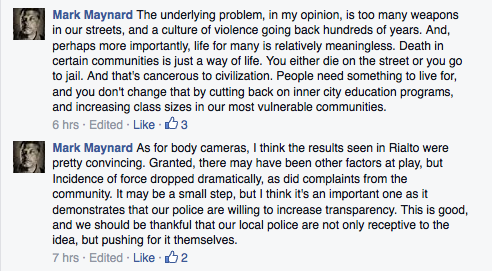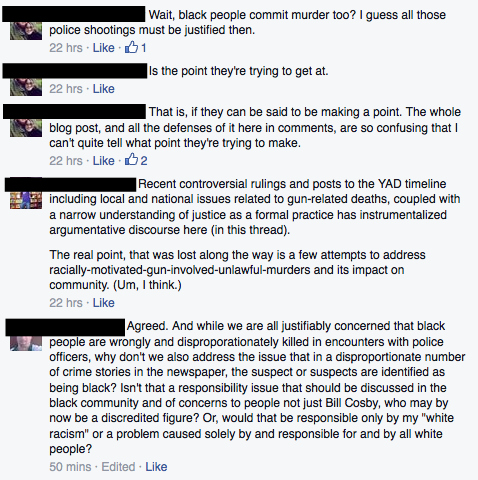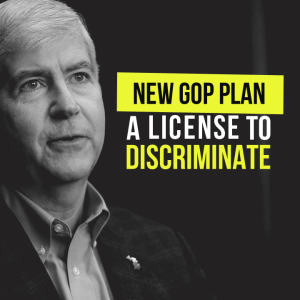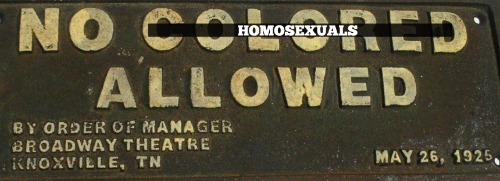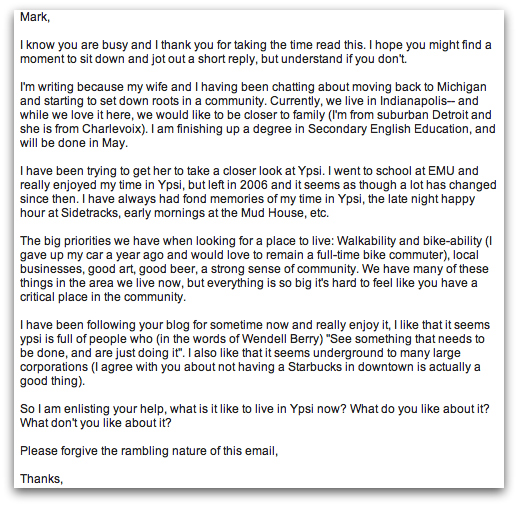On Tuesday evening, our City Council voted to approve a resolution making funds available, among other things, for the purchase of 15 body cameras to be worn by Ypsilanti police officers while on patrol. As readers of site know, this is something that I’ve been pushing for since first reading about the results of a trial in Rialto, California, where the use of body cameras in a test led to an 88% reduction in complaints agaisnt officers and a 60% decrease in the use of force, and I’m extremely happy to see that we’ve taken this first step. (Granted, there were likely other factors at play in Rialto, and cameras may not be the panacea that some are making them out to be, but I still think it’s a solid, necessary move toward increased transparency.) As the push to see body cameras rolled out in Ypsi came from Police Chief Tony DeGiusti, I reached out to him today to thank him for being proactive on this front, and ask him his thoughts on the future of policing in Ypsilanti. Following is our conversation. My hope, since we just scratched the surface, is that it’s just the first of many.
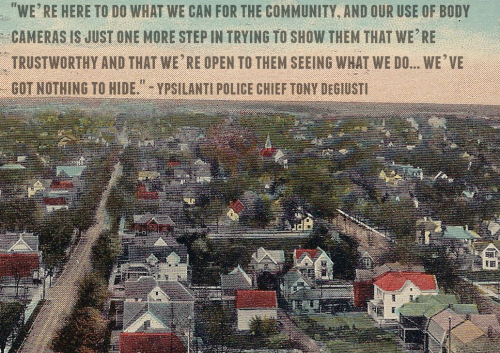
MARK: When did you first become aware that body cameras were being tested by departments like Rialto?
TONY: We probably first became aware of them in September of 2013. They started cropping up. And some of the vendors in the area were talking about them. And I think we got our hands on one shortly thereafter, to take a look at it, and think about the possibilities of what we could use it for… to decide whether that was a direction we wanted to go in or not.
MARK: Obviously, based on the fact that you just asked City Council for the funds to purchase 15 of them, you decided that it was something worth investing in. What was it that sold you on the idea?
TONY: Number one, a body camera fills in some gaps. We’ve had car cameras for a long, long time. It’s an industry standard now. We’re very used to that environment. Once you step away from the front of the car, though, you lose video. You still get audio, but there’s no video. And in those cases, sometimes the audio isn’t all that clear, because it has to be transmitted back to the car. You have wind noise, the rustling of clothing, any number of things that can cause interference. So body cameras are just the next piece, a continuation of what was already going on. So now we’ll have a view of what’s going on when it’s not happening directly in front of the police car.
MARK: Has there been any pushback from officers, or their union, or are people pretty much accepting of the fact that this is how things in your field are evolving?
TONY: Within our department there really is no resistance at all. In fact, many of the officers are anxious to get them.
MARK: Why is it that they want them? Is it just that they see a value in having recorded documentation of their interactions, or are there other benefits? For instance, do they feel that having these cameras will make it easier for them to do their jobs, as members of the community may perceive their adoption as an act of good faith on the part of law enforcement?
TONY: Obviously anything that promotes transparency is a means to improve the trust between the police and the community. And that’s really the key to any of these initiatives. It creates a common bond by demonstrating that we’re trying to do the right thing for the community. The community is safer, and we’re better able to address people’s needs, when the police and community are connected to each other. If you have a disenfranchised community, it’s very difficult to police that, because you don’t have any cooperation. Quite frankly, we’re not an occupying force. We’re a police department. We want to work with the community and make sure that we’re able to address the issues that need to be addressed.
MARK: In a note sent out a few days ago, City Council member Pete Murdock stressed the importance of a comprehensive plan regarding the roll-out and use of these cameras. “Police body cameras can be a great resource to building police community relations, and I’m very supportive of their use,” said Murdock, “but the policy and its implementation are more important than the cameras themselves.” He then linked to an article in Scientific American titled “Cities Want Cops To Wear Cameras But Technology Could Heighten Distrust If Not Carefully Used.” I’m curious as to your thoughts concerning the points raised in the article.
TONY: We are well aware that there are some concerns about privacy issues and how the cameras will be used. We are already sensitive to those issues and have addressed many of them in our current policy on in-car video cameras. There are strict rules and restraints on who has access to the video, who can view the video and a retention schedule that is reasonable in the length of time that we keep the video. The body cameras will be slightly different. As much as we are trying to prepare for every scenario, there will be a need to adjust to issues that we have not thought of. As part of that preparation we are looking into research and seeking advice from organizations like the International Association of Chiefs of Police and Department of Justice, as well as looking at policy in other areas that have had success with body cameras, like Rialto, California.
MARK: How long have you been working here in Ypsi?
TONY: I’ve been in the city of Ypsilanti for almost two years. Before that, I was the Deputy Chief in the city of Wayne. And I’d been in that department for 25 years.
MARK: How well did you know the community before coming here?
TONY: I’ve been connected to the town for quite some time. I became aware of Ypsi when I was about 18 years old. One of my friends went to Eastern. And, shortly thereafter, I went to Eastern myself, on a part-time basis. I was pretty much a career student for a while. And, sometime after that, I went back and got my masters degree at Eastern. So I’ve been in and out of town pretty much my entire adult life. So, when the opportunity came up to come here as Deputy Chief and work with Chief Walker, and I was ready to retire from the city of Wayne, it was just a golden opportunity, and I was very fortunate to get the job.
MARK: How have you liked it so far?
TONY: I love it.
MARK: Were there any challenges in transitioning from one community to the other?
TONY: It’s a little bit of a different environment for me. We didn’t have a major university close to us in the city of Wayne. So that’s a significant challenge. In Ypsilanti we have a pretty transient population that isn’t really connected to the community for the long haul. Not only that, but they’re at a kind of vulnerable age, where they still feel that they’re invincible, and can do anything. And sometimes they don’t use the best judgement in the kinds of things that they do, or expose themselves to. So those issues are kind of a challenge. And, you know, again, any police department anymore, you have to contend with with budget constraints and personnel. You’re trying to find better and new ways to get things accomplished with fewer resources.
MARK: Speaking of the budget, have things pretty much stabilized? It seems like it’s been a while since I’ve heard about cuts at the Police Department.
TONY: We pretty much cut back in our number of officers as far as we possibly could when I first got here. And we’ve been slowly adding officers since them. We were at an all-time low of 23 officers in September of last year. And we’re at 27 now, and we’re still continuing to hire. Obviously, you have to be very careful when you’re hiring officers. You want to be sure that you’re getting the best possible people, and the right people for the right positions. So we’re being cautious, but we’re hiring as many as we can, and as quickly as we can, but we want to make sure that we’re doing a good job of it.
MARK: There was talk a while back, at a point when finances looked particularly bad, of combining our police and fire departments here in Ypsi. Thankfully, I haven’t heard much mention of that lately. Is that conversation pretty much dead?
TONY: Yes, I think that idea has been pretty much put on the back burner for the time being… at least for the next few years. I know the Fire Department has a contract. And the Police Department has a contract. The unions have negotiated, I think, for the next three years. So, I wouldn’t see that coming up again in the near future. But, economically, who knows what happens? Everyone says we’re getting better. If we are, great. If not, we may have to look at some different options.
MARK: I’m curious as to how you talk with your officers about Ferguson and other similar issues that have been coming up around the country?
TONY: Here’s the key to that question… You don’t talk about Ferguson… And what I mean by that is that you don’t wait until something like Ferguson happens to discuss these kinds of issues. You talk about that every day. You talk about what it means to serve your community, what your goals are. Diversity is one of the biggest things about the city of Ypsilanti. We even wear it on our patch. So, it’s not something where you’d say, “Something bad happened somewhere,” or “This tragedy just happened,” so now we’re going to talk about it and address it. That’s something that you have to be ever vigilant about. You always have to put your best foot forward, and do your job as best as you possibly can. Do mistakes happen? Sure. Everybody has game days, and everybody has days that are down a little bit. But it’s the pursuit of trying to be the best that you can be every single day, along with some luck, obviously, that you avoid those kinds of situations. But it hasn’t altered the messages that our officers get every single day. Go out there and do the very best job you can, and be as equal and as fair to everyone as we possibly can be. Treat everybody like you would someone in your family and you should be pretty good.
MARK: Given these events which we seem to be hearing about so often now, from Ann Arbor to Staten Island, are you sensing a shift in public perception against the police? Are we at risk for a more antagonistic relationship between the police and members of our community? And, if so, what can you do to avoid that?
TONY: I have not noticed any shifts in attitudes towards the police in our city, and I have not heard our local departments reporting any either. The best way to avoid an antagonistic shift in attitude is to remain engaged. We don’t all have to agree on every subject, or the outcomes of different issues, but we have to remain willing to sit down at the table and respectfully have some conversations. I believe that a well-informed, cooperative and engaging relationship between the police and the community that they serve is the key to success in this area, and in good policing in general. It all boils down to trust and respect. Tragic things happen from time to time. They become compounded when there is a disconnect between the police and the community.
MARK: As a result of these recent events noted previously, is there any chance that protocols may change with regard to the use of deadly force?
TONY: I’m not really sure I can do this question justice since it may be a broader policy question across the profession as opposed to what we can affect just within the city. However, the department is constantly reviewing all of our policies to make sure that they are relevant and in line with what we believe are current best practices.
MARK: I’m not really up-to-date on new trends in policing. I know that, for several years, however, people around the industry were advocating for more “community policing.” Is that still the direction that things are heading, or has another paradigm taken it’s place?
TONY: We still firmly believe in the concepts behind community policing. Those are the things that work. Even early on, when I first got here, I talked with some people, and they asked, “What do you think of community policing?” And I said, “Well, it’s always worked.” If you look back to the ‘40s, you had officer Smith and officer Jones who worked 7th Street every single day. They walked the beat, and they knew everybody on the beat, and they knew how to take care of problems and address issues for people. That’s community policing, and they were doing it in the ‘40s. We got away from it when they started giving police officers cars.
So our thing at this point is, even though we’ve taken some cuts… In 2008, I think, we had 50 officers. Now, once we’re fully staffed, we’ll be at 31. So, obviously, with 19 fewer officers there are certain things you can’t do as well, or as much as you might want to. But we’re getting out in the community more. We’re trying to address those issues. We’ve got a program where we’re going to Perry school and reading the kids. We have a school resource officer that we work with in Ypsilanti Community Schools. And now we have an officer in the middle school. We have a downtown development officer dedicated to addressing issues in the Depot Town and Downtown areas. And we’ve got a lot of other things in the works. More outreach. We’re bringing back the Citizens Police Academy this year. That’ll be starting up in mid-January. So we’re trying to get back to some of the things that we did, and that we know work. We want more commonality between us and the community. That line of communication, if it’s working, opens up other things.
MARK: What’s the Citizens Police Academy?
TONY: It’s basically a short introduction to police work. It’s eight weeks long. And it’s intended to give some insight into the kinds of things we deal with… fact over fiction, perception vs. reality. You know, you watch CSI on television, and they take a sample to the lab and 15 minutes later they say, “This is so-and-so’s DNA profile.” Well, that’s not what really happens. What really happens is that we collect a sample, send it to the lab, and six months later they call and say, “We don’t have a match for you.” So we want to dispel some of that stuff. And there are classes on the roles and functions of police officers. Community policing practices. Patrol tactics. Things you do in the Detective Bureau. Crime scene investigation techniques. It’s just kind of an overview of all the different kinds of things that we do as police officers. And you also get a firsthand look at policing. Everyone who goes through the program does a ride-along with officers.
MARK: How many people are you hoping to put through the Academy?
TONY: We’re probably going to limit it to 20 people at a time. and we’ll keep doing it as long as there’s an interest.
MARK: As long we’re talking, I’d like to ask you about the Leforge Road area, which was kind of the hot area of town this past summer, with a number of shootings and the like. As I recall, a deal was struck between County, City and EMU forces to intensely patrol that area. How’s it been going?
TONY: Correct. We refer to the partnership as the Eastern Washtenaw Safety Alliance. It’s a cooperative effort between us, the Sheriff’s department, and EMU. We’re not necessarily roaming around everywhere at the same time, but we’re overlapping in some areas. And we’ve got some other cooperative efforts. One of them is what we call the YCAT team. The Ypsilanti Community Action Team. It’s one officer from our department, a Sherrif’s deputy and an EMU officer, and they work out of our department here. And it’s generally their job to go out and hit the hot spots in town, and the densely populated student areas. And that’s what kind of morphed out of the Leforge Road initiative. So it’s just like anything else… The path of least resistance… If you hit one area hard, the people who would cause trouble there will go somewhere else. So what we’re basically doing is running from one place to another, chasing the problems and trying to address them. And YCAT is basically the go-to team to look at the data and deal with these issues.
MARK: Speaking of other jurisdictions, and how we work with them, are there other examples of regional cooperation that you might be able to tell us about?
TONY: There’s a lot that’s going on across the County. There are some recognized areas where we all know that we need help. A couple come immediately to mind. A regional SWAT team. It’s consortium based, and that team covers the entire County. So we have a few officers in it. Ann Arbor has a few. The Sheriff’s department has a few. EMU and UM have also put some people on it. So that’s one area where where we’re cooporating. Also, we understand, God forbid, that if we have an active shooter at a school, or in a shopping area, no one jurisdiction is going to be able to handle that. So we actually train together on those types of scenarios. So every officer in Washtenaw County has received the exact same training, and has mingled with these other officers in mock scenarios.
MARK: Speaking of SWAT teams, I’m curious as to your thoughts on the militarization of police forces as more and more military hardware is making its way into our local public safety departments around the country. Is there a line that we’re in danger of crossing between the police and the military?
TONY: The police are not the military. That’s clear in the mission. It’s different. However, you have to remember that we’re tasked with certain things that require certain types of equipment. If you wait until something bad happens before you get the kinds of of equipment that you need in order to take care of it, you’re not going to be able to do that. With that said, none of that military equipment has come to our department. Other departments have availed themselves of those things, and some of the smaller departments, who can’t afford a lot of things, probably have the most to benefit from those programs. But, if you remember, in Water Town, when they were looking for the Boston bomber, if you’re waiting to have rifles and night vision equipment, thermal optics, until you need them, that whole situation could have turned out a lot differently. So there’s a delicate balance. 50 years ago, no one thought, “What are you going to do if someone shoots up a school?” Now it’s a reality. It happens every year. So we have to be prepared for that. So, if you have a great distance to cover, like a school hallway, a simple handgun isn’t going to be able to do the job. So that led to the advent of the patrol rifle for police departments.
MARK: I know very little about the internal operations of the police force and what say, if any, the community has over the setting of policies and procedures. Is there, for instance, a board comprised of community members that you rely on to help make policy decisions, set objectives, etc?
TONY: We do not have a board that oversees police policy and procedure. Just about everything that we do has a policy or a procedure attached to it, though. Most policy is rooted in legislated laws and court decisions that affect the rules of evidence etc. An example would be the recent requirement that we video tape confessions on major felonies. There is no discretion in this area. The law requires it so we do it. However, we are interested in the public’s perception of what the goals and desires are for the police department. In that light, we are soon to start to work on our five year strategic plan. As part of that process we are going to get people from the community to give some input into what they feel are important issues. We are still working out what that model is going to look like, but we will be doing it in early 2015.
MARK: What haven’t I asked you?
TONY: (Laughs.) You’ve actually asked me a lot more than anyone else… I’ve been talking with a lot of people today… We’re here to do what we can for the community, and our use of body cameras is just one more step in trying to show them that we’re trustworthy and that we’re open to them seeing what we do… We’ve got nothing to hide.

